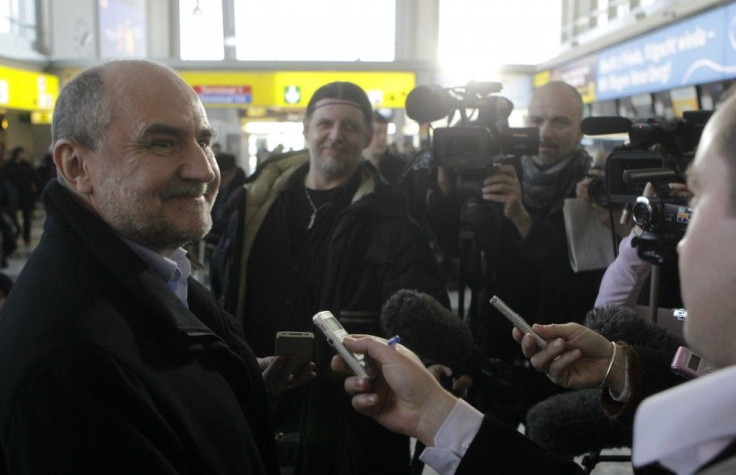UN Nuclear Inspectors in Iran on the Day of Oil Embargo Vote

UN nuclear inspectors have arrived in Iran on the same day Tehran prepares to ban oil exports to Europe in retaliation for new European Union sanctions.
The head of the International Atomic Energy Agency delegation said he aimed to resolve all the outstanding issues with Iran over its nuclear programme, which the West believes is aimed at making weapons, but which Iran insists is peaceful.
In particular, we hope that Iran will engage with us on our concerns regarding the possible military dimensions of Iran's nuclear program, IAEA Deputy Director General Herman Nackaerts told reporters before departing from Vienna's international airport.
That may be a tall order, with Iran insisting its right to peaceful nuclear technology be recognised by sceptical countries that say its uranium-enrichment activities -- some of which have been moved to a bomb-proof bunker -- go beyond what is needed for atomic energy.
Tensions with the West rose this month when Washington and the European Union imposed the toughest sanctions yet in their campaign to force Tehran into making concessions. The measures take direct aim at the ability of the Organization of the Petroleum Exporting Countries' second-biggest crude exporter to sell its oil.
Less than one week after the EU's 27 member states agreed to stop importing crude from Iran as of 1 July 1, Iranian lawmakers were due to debate a bill later on Sunday that would cut off oil supplies to the EU in a matter of days.
By turning the sanctions back on the EU, lawmakers hope to deny the bloc a six-month window it had planned to give those of its members most dependent on Iranian oil -- including some of the most economically fragile in southern Europe - to adapt.
Buyback Problems
The head of the state-run National Iranian Oil Company (NIOC) said late on Saturday that the export embargo would hit European refiners, such as Italy's Eni, that are owed oil from Iran as part of long-standing buyback contracts under which they take payment for past oilfield projects in crude.
The decision must be made at high echelons of power, and we at the NIOC will act as the executioner of the policies of the government, Ahmad Qalebani told the ISNA news agency.
The European companies will have to abide by the provisions of the buyback contracts, he said. If they act otherwise, they will be the parties to incur the relevant losses and will subject the repatriation of their capital to problems.
Generally, the parties to incur damage from the EU's recent decision will be European companies with pending contracts with Iran.
Italy's Eni is owed between $1.4 billion and $1.5 billion in oil for contracts it executed in Iran in 2000 and 2001. It has been assured by EU policy makers its buyback contracts will not be part of the European embargo, but the prospect of Iran acting first may put that into doubt.
Eni declined to comment on Saturday.
The EU accounted for 25 percent of Iranian crude oil sales in the third quarter of last year. However, analysts say the global oil market will not be overly disrupted if Iran's parliament votes for the bill that would turn off its oil tap for Europe.
The Saudis have made it clear that they'll step in to fill the void, said Robert Smith, a consultant at Facts Global Energy. It would not pose any serious threat to oil-market stability. Meanwhile Asians, predominantly the Chinese and Indians, stand to benefit from more Iranian crude flowing east and at potential discounts.
Potentially more disruptive to the world oil market and global security is the risk of Iran's standoff with the West escalating into military conflict.
Iran has repeatedly said it could close the vital Strait of Hormuz shipping lane should Western sanctions succeed in preventing it from exporting crude, a move Washington has said it would not tolerate.
The IAEA's three-day visit may be an opportunity to defuse some of the tension. Director General Yukiya Amano has called on Iran to show a constructive spirit, and Tehran has said it is willing to discuss any issues of interest to the U.N. agency, including the military-linked concerns.
But Western diplomats, who have often accused Iran of using such offers of dialogue as a stalling tactic while it presses ahead with its nuclear program, say they doubt Tehran will show the kind of concrete cooperation the IAEA wants.
They say Iran may offer limited concessions and transparency in an attempt to ease intensifying international pressure, but that this is unlikely to amount to the full cooperation required.
The outcome could determine whether Iran will face further international isolation or whether there are prospects for resuming wider talks between Tehran and the major powers on the nuclear dispute.
(Additional reporting by Hashem Kalantari in Tehran, Svetlana Kovalyova in Milan and Fredrik Dahl in Vienna; Writing by Robin Pomeroy; Editing by Andrew Roche)
© Copyright Thomson Reuters 2024. All rights reserved.






















